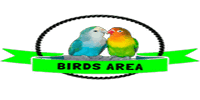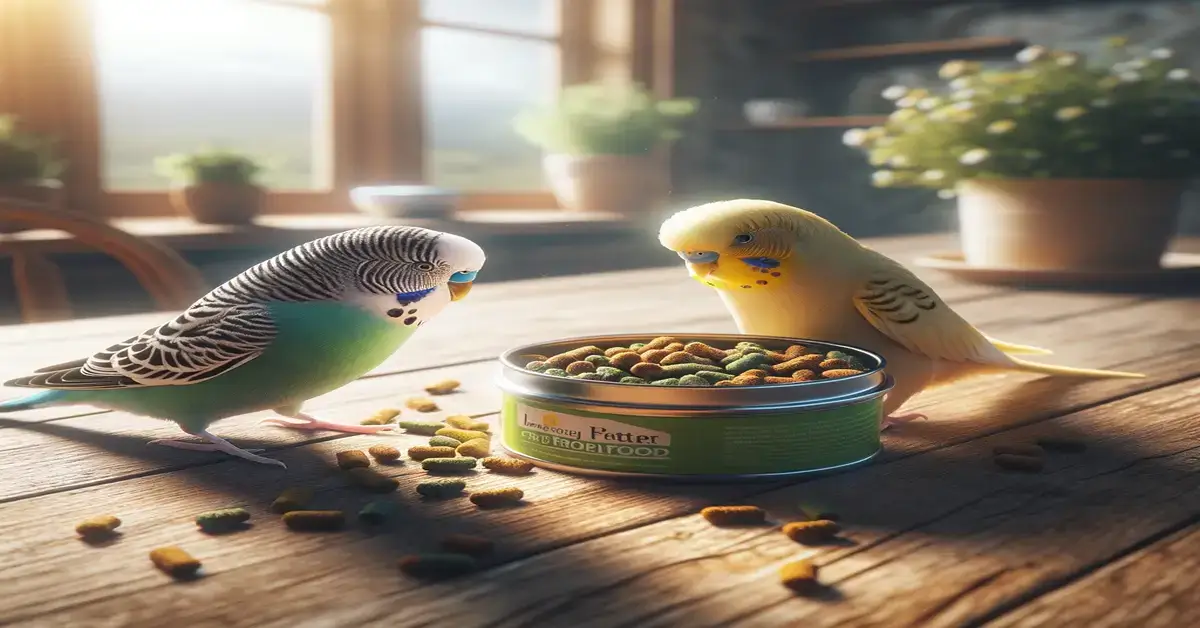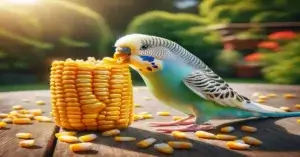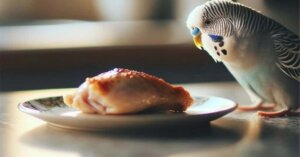Can Budgies Eat Parrot Food? Discover the Surprising Answer Here
Budgies have specific dietary needs that must be met for optimal health. Their diet primarily consists of seeds, pellets, fruits, and vegetables.
However, it is important to provide a balanced diet that includes essential nutrients such as protein, carbohydrates, fats, vitamins, and minerals.
Additionally, budgies need access to fresh, clean water at all times. Proper nutrition is crucial for the overall well-being of budgies and can help prevent health issues in the long run.
Can Budgies Eat Parrot Food?
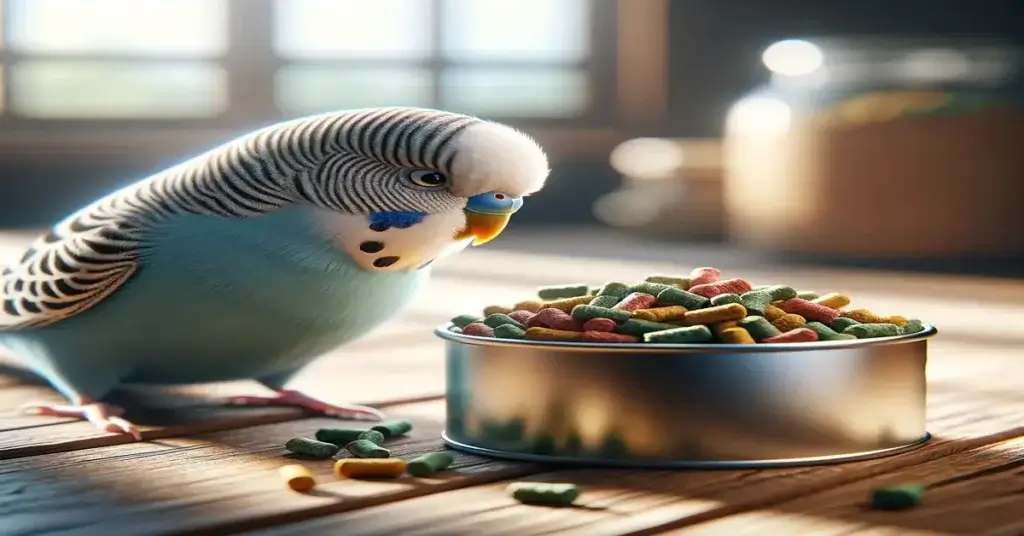
Yes, budgies can eat parrot food, but it is important to choose the right type and ensure it meets their specific nutritional needs.
Parrot food is generally formulated for larger parrot species and may not provide the necessary nutrients in the correct proportions for budgies. It is recommended to select budgie-specific food options to ensure their dietary requirements are met.
Key Differences Between Budgie Food and Parrot Food
Budgie food and parrot food have some key differences in terms of size, composition, and nutritional content.
Parrot food is generally formulated for larger parrot species and may contain larger seeds and nuts that are difficult for budgies to consume.
Additionally, parrot food may not provide the specific nutritional requirements that budgies need, such as a higher proportion of seeds and grains.
However, it is important to choose budgie-specific food options to ensure their dietary needs are met.
Safe Parrot Food Choices for Budgies
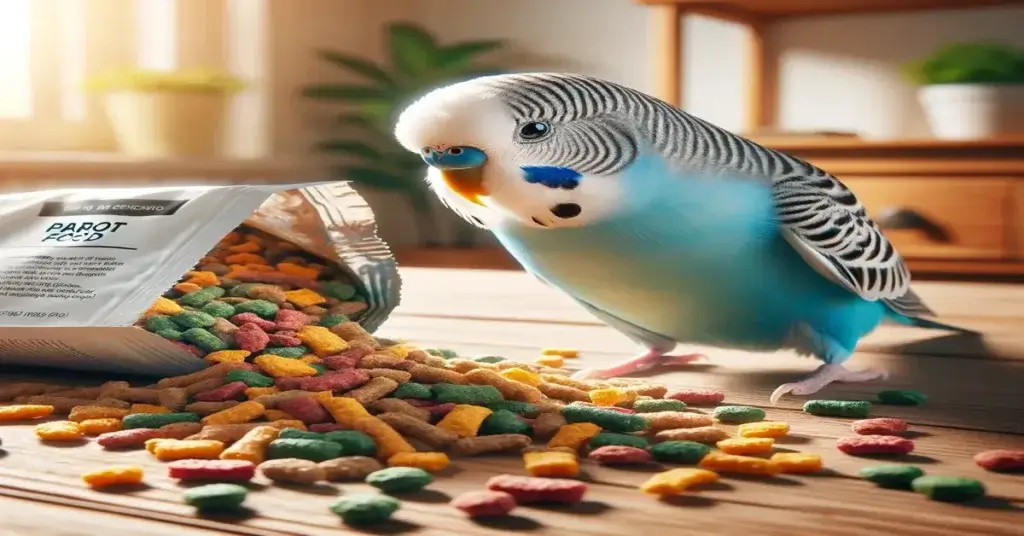
When it comes to choosing parrot food for budgies, it is important to select options that are safe and appropriate for their smaller size and unique nutritional needs.
Opt for budgie-specific seeds and pellets that provide a balanced mix of nutrients. Additionally, offering fresh fruits and vegetables as part of their diet can help provide essential vitamins and minerals.
Always consult with an avian veterinarian for specific feeding recommendations for your budgie.
1. Seeds, Pellets, and Nutritional Requirements
Seeds and pellets are key components of a healthy budgie diet. Opt for budgie-specific options that provide a balanced mix of nutrients, including essential vitamins and minerals.
Seeds should make up about 10-20% of their diet, while pellets should make up the majority. Be sure to choose high-quality pellet brands that are specifically formulated for budgies to ensure they receive all the necessary nutrients for optimal health.
2. Fruits and Vegetables for Budgies
Budgies can enjoy a variety of fruits and vegetables as part of their diet. Some safe options include apples, carrots, spinach, kale, and bell peppers. These foods provide essential vitamins and minerals, as well as dietary fiber.
However, it’s important to introduce new fruits and vegetables gradually to avoid digestive upset. Wash and chop the produce into small, manageable pieces, and remove any seeds or pits before offering them to your budgie.
Risks of Feeding Budgies Parrot Food

Feeding budgies parrot food can pose several risks to their health and well-being. Parrot food often contains larger seeds and nuts that can be difficult for budgies to crack open, leading to potential choking hazards.
Additionally, parrot food may not meet the specific nutritional requirements of budgies, causing imbalances in their diet and potential deficiencies. It is important to provide budgies with their specific food to ensure their optimal health.
Potential Health Issues for Budgies
Feeding budgies parrot food can lead to potential health issues. The larger seeds and nuts found in parrot food can be difficult for budgies to crack open, posing a choking hazard.
Additionally, parrot food may lack the essential nutrients that budgies require, leading to imbalances in their diet and potential deficiencies. It is important to provide budgies with a specific diet to maintain their overall health and well-being.
Impact of Incorrect Diet on Budgie’s Well-being
Feeding budgies parrot food can hurt their overall well-being. The lack of essential nutrients in parrot food can lead to imbalances in their diet, potentially causing deficiencies and health issues.
Budgies may experience problems with their feathers, digestion, and overall growth if their nutritional needs are not met. It is crucial to provide them with a specific diet tailored to their requirements to ensure their optimal health.
Transitioning Budgies to Parrot Food
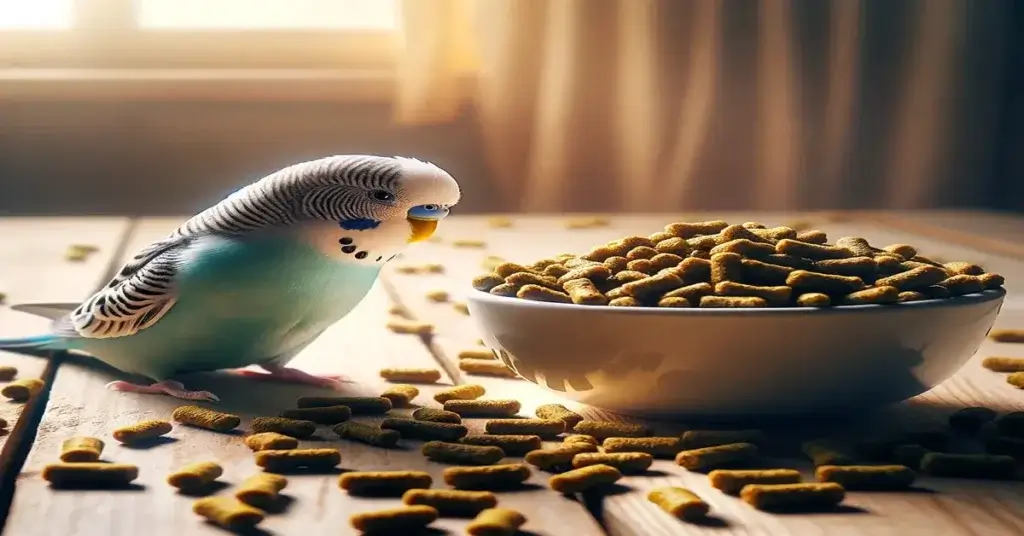
The transition from a solely budgie-focused diet to parrot food should be done gradually to avoid digestive upset. Start by introducing small amounts of parrot food alongside their regular diet and gradually increase the proportion of parrot food over time.
Observe their response to the new food and make adjustments as needed. It’s important to note that not all budgies will readily accept parrot food, so patience and persistence are key.
Gradual Diet Changes for Budgies
Transitioning Budgies to Parrot Food should be done gradually to avoid digestive upset.
Start by introducing small amounts of parrot food alongside their regular diet and gradually increase the proportion of parrot food over time.
Observe their response to the new food and make adjustments as needed. It’s important to note that not all budgies will readily accept parrot food, so patience and persistence are key.
Monitoring Budgie’s Response to New Foods
When introducing new foods to your budgie’s diet, it’s essential to monitor their response closely. Keep an eye out for any changes in their behavior, appetite, and droppings.
Look for signs of allergies or digestive issues such as diarrhea or vomiting. If your budgie shows any negative reactions, remove the new food and consult with a veterinarian. Regular monitoring allows you to make adjustments and ensure your budgie’s overall well-being.
Expert Recommendations and Guidelines
Experts recommend following these guidelines when feeding budgies parrot food:
- Consult with an avian veterinarian: It is essential to seek professional advice before introducing any new foods to your budgie’s diet. Veterinarians can provide specific recommendations based on your budgie’s individual needs.
- Choose high-quality parrot food: Look for reputable brands that provide a balanced diet for budgies. Check the ingredients list to ensure it includes a variety of seeds, pellets, and vitamins.
- Provide a variety of fresh foods: Along with parrot food, offer a range of fresh fruits and vegetables to provide additional nutrients and variety to your budgie’s diet.
- Clean and rotate food dishes: To maintain hygiene, clean food dishes regularly and rotate food options to prevent staleness.
- Monitor your budgie’s weight and health: Regularly weigh your budgie and monitor their droppings, behavior, and overall health. If you notice any abnormalities, consult with a veterinarian.
Following these expert recommendations and guidelines will help ensure your budgie’s diet is healthy and balanced, promoting their overall well-being and longevity.
Advice from Avian Veterinarians
Avian veterinarians strongly advise consulting with them before introducing any new foods to a budgie’s diet. They can provide personalized recommendations based on the bird’s specific needs and health conditions.
They emphasize the importance of a balanced diet and can guide owners in selecting high-quality parrot food. Regular veterinary check-ups are also recommended to monitor the budgie’s overall health and ensure they are receiving the proper nutrition.
Best Practices for Feeding Budgies Parrot Food
When feeding budgies parrot food, it is important to follow some best practices to ensure their health and well-being:
- Consult with an avian veterinarian to determine the appropriate parrot food for your budgie.
- Gradually introduce new foods to prevent digestive issues.
- Monitor your budgie’s response to new foods and make adjustments as necessary.
- Provide a mix of seeds, pellets, fruits, and vegetables to meet their nutritional needs.
- Regularly clean and refill food dishes to prevent contamination.
- Offer fresh water at all times.
- Consider offering foraging opportunities to keep your budgie mentally stimulated.
Following these best practices will help ensure your budgie receives a balanced diet and remains healthy.
Frequently Asked Questions For Can Budgies Eat Parrot Food
Can A Budgie Eat Cockatiel Food?
Yes, budgies can eat cockatiel food as long as the pellet size is appropriate. Pellets are made from ground seeds, grains, and added nutrients. It is important to provide a balanced diet with fresh vegetables and fruits.
What Can I Feed My Budgie If I Don’t Have Bird Food?
If you don’t have bird food, you can feed your budgie a variety of seeds, greens, vegetables, and fruits. It’s important to have a balanced diet using dry and sprouting seeds, with fresh foods as add-ons.
What Live Food Can Budgies Eat?
Budgies can eat green beans, carrots, peas, cabbage, cauliflower, sweet corn, and sweet potato. Avoid onions, mushrooms, and garlic.
Sum Up
Keeping your budgies well-fed and happy is super important. Even though food for parrots might seem okay, make sure it’s right for small birds like them. They like a mix of seeds, greens, veggies, and fruits.
Mix up dry seeds with some fresh stuff. It’s all about balance. And, watch out! Don’t give them stuff that’s bad for birds, like onions, mushrooms, and garlic.
Give them a varied menu, and you’ll have cheerful, healthy budgies.
Fancy sharing this tip? It could help other budgie buddies out there. Thanks for reading.
Hello Dear, I'm Poli Kolymnia, owner of many birds (including budgies).
With a deep passion for these feathered companions, I'm here to share my expertise and extensive knowledge on birds care.
My articles cover essential topics like diet, housing, care, and health, providing practical tips to help you create a happy and thriving environment for your birds.
